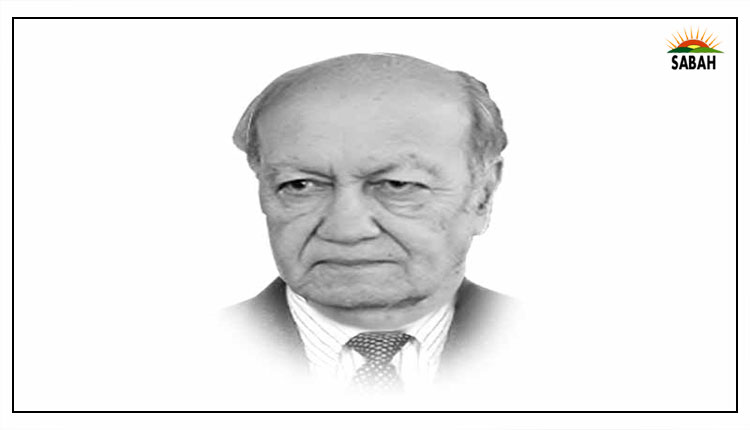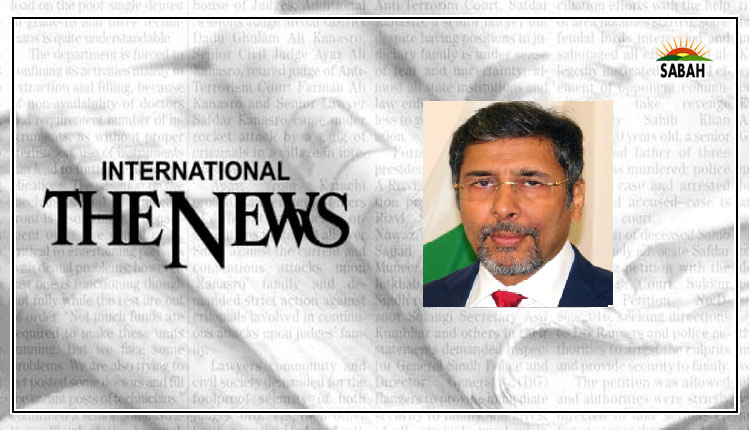Drawing in the diaspora .. Jauhar Saleem
It has been estimated that our diaspora, numbering over 10 million, has a combined earning per annum comparable to Pakistan’s GDP of $340 billion. Given the vastly superior income level, their saving capacity, and hence capacity to invest, is perhaps greater than those living in Pakistan itself.
It is also common knowledge that without the remittances sent by the diaspora – of around $30 billion a year – our economy would collapse. But why do we not receive much in terms of FDI or portfolio investment from our compatriots abroad, at a time when the economy faces an existential crisis, desperately needing foreign investment?
At its very inception, China’s phenomenal economic takeoff was made possible by investment from affluent diaspora abroad. India’s economic miracle owes much to the massive foreign investment and outsourcing from abroad, supported by rich NRIs, especially those who reached the top tiers of the corporate ladder.
Conversely, we have failed to economically engage the overseas Pakistanis to a desirable degree, which has greatly contributed to our economic woes. It is sad to see the state seeking the generosity of friendly countries, or bending over backwards to please international financial institutions to borrow a few billion dollars, while the paramount source we are blessed with for bringing in tens of billions of dollars remains largely untapped.
Attracting ‘hundred-billion-dollar worth FDI’ from friendly countries – through the SIFC mechanism – is our biggest hope for now, as repayment of the accumulated debt in the next three years looms large. But hope is not a policy. Even friends do not invest if they are unconvinced of worthwhile financial returns. Besides, foreign investment in countries with a subpar nation brand has a short-term perspective generally, and the investors end up taking back out more than they bring in. We have experienced this phenomenon in the past in our banking and telecom sectors.
Pakistan’s best chance to revive its economy may lie in convincing the diaspora to send more remittances through official means, trade more with the mother country, and start investing in Pakistan. Their investment would not only bring direly needed foreign exchange, but also fresh ideas and expertise, not to mention the technology they have better access to than us. Their investment is also likely to have a longer-term perspective.
If it is so critical to encourage the diaspora to enhance their economic engagement with Pakistan, then we need to carefully examine and address key factors that prevent this from happening.
First and foremost is the perception that any investment in Pakistan is not secure. As Pakistan’s ambassador to Bahrain, Germany and Italy, amongst other countries, my extensive contact with the diaspora brought out that they have zero trust in Pakistan’s bureaucracy and judicial system, in terms of protection of property rights or enforcement of contracts. And these two elements are essential attributes for creating an enabling environment for greater economic engagement.
Having witnessed instances of extreme high-handedness by segments of state bureaucracy, particularly the so-called urban development authorities, I know how genuine this perception is. In one instance, the possession of a piece of land purchased in a public auction was not handed over in 17 years by the CDA. In another instance, a piece of land bought in a public auction held by the LDA was not transferred even after two decades. In both cases, the obstacle was the ‘qabza mafia’ which has permeated the bureaucracy of development authorities, as well as the criminal justice apparatus. In both instances, recourse to judicial processes proved unproductive given the inordinately slow justice dispensation.
That is exactly why affluent members of our diaspora abroad do not invest in the real-estate sector, the largest segment of the economy at present. Since acquisition of land is also a vital element of setting up industry, the hold of the ‘land mafia’ also discourages investment in industry in effect.
Affluent overseas Pakistanis do not trust, for the most part, that they will get what they pay for while buying property back home. Or that they would be able to protect their purchase from ‘qabza mafias’. They are also not confident that any contracts they enter – without which no business can be established or run – would be enforced, because the judicial system is fatally flawed. Resultantly, it is only the less affluent who mostly send money back home to sustain their families or buy small properties.
What can be done to build the diaspora’s confidence? First, there is a need to reform urban development authorities. Manned mostly by bureaucrats on deputation, with no expertise or capacity for service delivery in an efficient manner, these authorities have become dens of red tape and corruption and serve as accessories to land mafias.
There should be much smaller, tech savvy organizations manned by permanent employees with qualification and experience in management, engineering, urban planning, architecture, and ICT.
Land record, which is kept in the shape of dusty files rotting in shabby rooms – easily set alight or misplaced whenever required by the land mafias – should be computerized and all public-related services be made available online so that overseas Pakistanis can access them conveniently. The archaic rules and procedures laid out for getting simplest of tasks done need to be revised drastically; and as many services as possible be outsourced to the private sector.
We also need to get rid of the infamous, inefficient and incorrigible ‘patwari’ system. Rapidly expanding cities have resulted in more and more urban areas getting under their control. And that has been a disaster. The ongoing computerization of land records is creditable. But if the system stays under the patwaris’ watch it can create more problems than solutions. In one instance, I witnessed a 12-kanal piece of land shrink to three marlas following the process of digitalization, courtesy connivance of the qabza mafia and the local patwari. Getting it reversed proved to be a Herculean task.
Second, for financial and property related irregularities and crimes, a dedicated agency for overseas Pakistanis needs to be set up where officials with degrees in business, finance, law, criminology and IT should be handling cases, rather than the semi-literate investigation officers posted in police ‘thanas’ who have no capacity to handle financial crime. And who deem the accused as their clients.
Our lower courts are equally ill-equipped to rule on economic crime and contract enforcement. Overloaded with cases, and with scant capacity for commercial adjudication, judges generally avoid deciding such cases. Lawyers with great expertise in dilatory tactics make matters worse. The final decision of a case may take decades. And even when a case is decided by the Supreme Court, on an IC appeal, it may be remanded to a trial court, setting in motion a process of another 20 years.
There is a dire need for commercial courts, such as the DIFC in Dubai, dedicated for overseas Pakistanis, where a case could be decided within six months, with only one right of appeal, which should not take more than three months. If our legal system were brought at par with the world standards, most cases would not even go to trial and be settled between layers of the parties involved.
To facilitate investments by overseas Pakistanis in sectors other than real estate, a specialized wing can be created in the SIFC, which should be manned by investment experts hired from amongst overseas Pakistanis. In its current form, the organization appears too bureaucrat-heavy and may not be particularly effective in serving the diaspora.
In fact, it would be useful to hire qualified members of the diaspora in the topmost cadres of all service delivery organizations that overseas Pakistanis interact with. This way they could bring fresh thinking, dynamism and a public-friendly culture to replace the red tape and colonial mindset prevalent in our public organizations. In my experience as an envoy abroad, whenever I contacted any diaspora members heading governmental organizations, to resolve issues faced by overseas Pakistanis, they were much more helpful and effective than career bureaucrats.
A major worry for the national exchequer are the dwindling remittances. As ambassador to Italy, I was able to support a record increase in remittances through enhanced engagement between the community and our leading banks. I believe remittances have started declining because of the unfortunate measures which widened the gap between open market and official forex rates, encouraging the use of ‘hundi’. While that was reversed to some extent subsequently, we lost the confidence of the overseas community.
We need to find mechanisms whereby the diaspora gets a slightly higher rate than the open market rate, while sending money through official channels. It would be much better to pay our own more in rupees, rather than paying foreign lenders more in dollars as interest to meet our foreign exchange needs.
The writer, an alumnus of UPenn, Johns Hopkins and Georgetown, has worked at the highest echelons of the Pakistan Foreign Service. He tweets/posts @JauharSaleem
Courtesy The News












